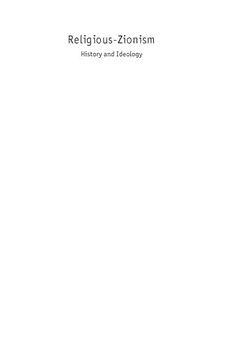
Religious-Zionism: history and ideology PDF
Preview Religious-Zionism: history and ideology
Religious-Zionism History and Ideology Emunot: Jewish Philosophy and Kabbalah Dov Schwartz (Bar-Ilan University, Ramat-Gan), Series Editor Editorial board Ada Rapoport-Albert (University College, London) Gad Freudenthal (C.N.R.S, Paris) Gideon Freudenthal (Tel Aviv University) Moshe Idel (Hebrew University, Jerusalem) Raphael Jospe (Bar-Ilan University) Ephraim Kanarfogel (Yeshiva University) Menachem Kellner (Haifa University) Daniel Lasker (Ben-Gurion University, Beer Sheva) Religious-Zionism History and Ideology Dov Schwartz Translated by Batya Stein Boston 2009 Library of Congress Cataloging-in-Publication Data Schwartz, Dov. Religious-Zionism : history and ideology / Dov Schwartz ; translated by Batya Stein. p. cm. — (Emunot: Jewish philosophy and Kabbalah) ISBN 978-1-934843-25-3 1. Religious-Zionism. 2. Religious-Zionism—History. I. Title. DS150.R32S3694 2009 320.54095694—dc22 2008050465 Copyright © 2009 Academic Studies Press All rights reserved ISBN 978-1-934843-25-3 Book design by Yuri Alexandrov Published by Academic Studies Press in 2009 28 Montfern Avenue Brighton, MA 02135, USA [email protected] www.academicstudiespress.com iv Contents Preface . . . . . . . . . . . . . . . . . . . . . . . . . . . . . . . . . . . . . vii Chapter One. A Revolutionary Consciousness . . . . . . . . . . . . . . . . . . 1 Chapter Two. Rabbi Reines and the Foundation of the Mizrachi . . . . . . . . . 10 Chapter Three. Religious-Zionist Education: Beginnings . . . . . . . . . . . . 19 Chapter Four. Rav Kook: An Orthodox-National Alternative to Religious-Zionism 27 Chapter Five. The Foundation of the Chief Rabbinate . . . . . . . . . . . . . . 34 Chapter Six. Ha-Po‘el ha-Mizrachi: Against the Exile and the Bourgeoisie . . . 42 Chapter Seven. Criticizing Zionist Policy . . . . . . . . . . . . . . . . . . . . . 51 Chapter Eight. The Settlement Drive . . . . . . . . . . . . . . . . . . . . . . . 63 Chapter Nine. Religious-Zionism and the Holocaust . . . . . . . . . . . . . . . 71 Chapter Ten. Israel’s First Years: Hopes and Disappointments . . . . . . . . . . 81 Chapter Eleven. From Rearguard to Vanguard: The Struggle for Greater Israel . . 95 Chapter Twelve. Religious-Zionism in the United States . . . . . . . . . . . . 105 Chapter Thirteen. Religious-Zionism: Present and Future . . . . . . . . . . . 115 Bibliography . . . . . . . . . . . . . . . . . . . . . . . . . . . . . . . . . 124 Index of Names . . . . . . . . . . . . . . . . . . . . . . . . . . . . . . . . 138 Index of Subjects . . . . . . . . . . . . . . . . . . . . . . . . . . . . . . . 143 v Contents vi Preface PREFACE In this book, I review the history of religious-Zionism from a historical and ideological-theological perspective. My basic assumption is that religious- Zionism cannot be fully understood solely through a historical description, or even from social, political, and philosophical vantage points. A periodization assumption is warranted here: religious-Zionism was established in 1902 with the creation of the Mizrachi, and traces its roots to the Hibbat Zion movement. To some extent, religious-Zionist thought repre- sents a continuation of the work of Mordechai Eliasberg, Shmuel Mohilewer, and Naphtali Zvi Berlin (Ha-Natziv), central Hibbat Zion leaders in their spiri- tual influence and in their action who understood, for instance, that the ideal of national renaissance requires them to be open to general culture. Some scholars have dated the beginning of religious-Zionism to the end of the nineteenth century and even earlier. Religious-Zionist historiography has indeed attempted to emphasize the movement’s continuity and, in this view, Abraham was the first Zionist and Nahmanides’ emigration to Eretz Israel was another landmark in the realization of the Zionist-religious ideal. My approach, however, views the creation of the Mizrachi as the true revolution. At this point, the religious and rabbinic world entered institu- tionalized politics and, to some extent, assumed the demands of modernity. At this point, religious Jews acknowledged that the promotion of their cause depended upon their recognition of the secular political establishment (the World Zionist Organization) and actual involvement in its activity. Through this act, the followers of Yitzhak Ya‘akov Reines and Ze’ev Jawitz recognize that the redemption of the people and of the land is led by a secular institution that strives to establish a secular regime and a secular culture. Hibbat Zion members did not take such a step and did not commit themselves to the iden- tity crisis that accompanied it. Religious-Zionism, then, begins when the Mizrachi becomes a faction of the World Zionist Organization. vii Preface I am grateful to Brill for permission to include in this book an adapted version of entries I wrote for the Encyclopaedia of Judaism, edited by Jacob Neusner, Alan J. Avery-Peck, and William Scott Green. I would like to thank Dr. Raphael Jospe for his comments and David Louvish for the translation of a previous version of Chapter One. This work was translated and edited by Batya Stein, who skilfully turned it into a clear, fluid, and unified text, and I thank her for it. Religious-Zionism History and Ideology Contents x
